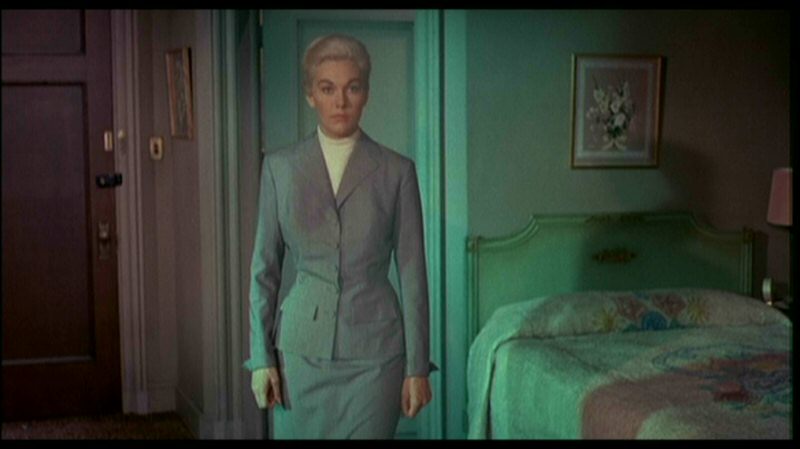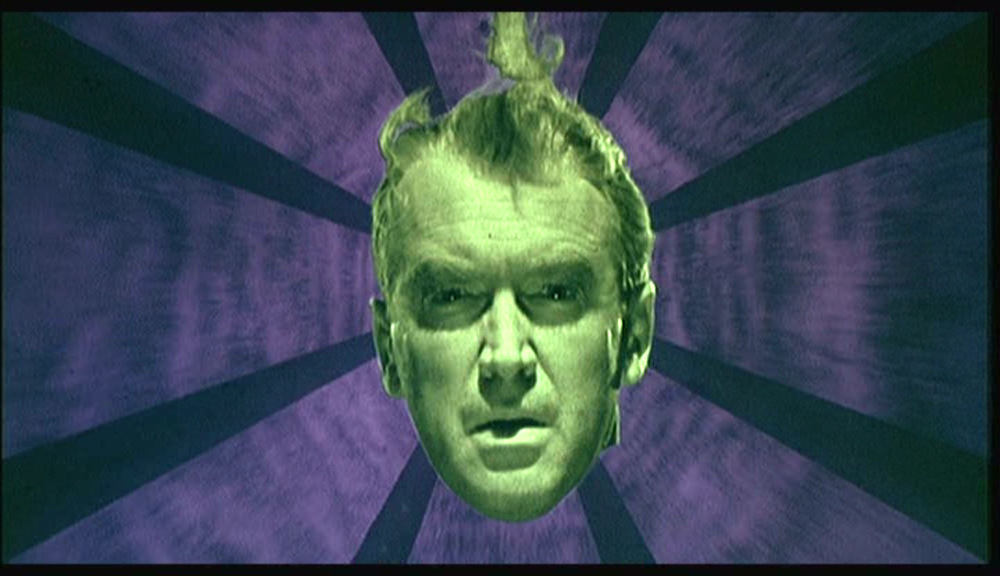 |
| Nothing says love like duplicity and murder |
A film’s status as a classic is marked by several
varying factors including its critical success, commercial success, and
ultimate legacy. One of the most crucial factors in a film’s success is its
ability to resonate with audiences both initially and over the course of
several viewings. While some films fade after their initial, overnight ,success
others gain prestige as time goes on and audience perceptions change in their
favor. One film with an ever evolving reputation is the Alfred Hitchcock fan favorite
Vertigo. Through its innovative
cinematography, memorable score, and iconic performances, Vertigo has gone from box-office disappointment to collectible
classic since its release in 1958.
The story begins on a suspenseful note typical of
Hitchcock as police officer John ‘Scotty’ Ferguson (James Stewart) attempts to apprehend
a criminal with his partner. Tragedy strikes when Scotty’s partner falls, and is left hanging onto the edge of a building for his life during a rooftop chase. Despite his best efforts,
Scotty is unable to overcome his crippling fear of heights to help his partner,
who falls to his death. Scotty determines that his phobia is too great a
handicap for a policeman to have and retires from the force, completely
devoting himself to the task of overcoming his fear. He starts out pursuing his
goal with high hopes through the help of his friend/ex girlfriend, Midge (Barbara
Bel Geddes), but is quickly disappointed with the failure ridden process. His
course soon changes, however, when old college friend Gavin Elster (Tom
Helmore) approaches him with an offer to work as a private investigator. Elster explains
that he fears for his suicidal wife, Madeleine's (Kim Novak), safety after she has taken to wandering
about the city without telling anyone where she is going or why. Scotty
initially refuses the offer, but soon finds himself too intrigued not to
accept, and pursues Madeleine across San Francisco.
By putting together information from his conversations with Elster and
Madeleine’s trance-like behavior, Scotty concludes that Madeleine is possessed
by the ghost of her late great-grandmother, Carlotta, or at least thinks that
she is. The more that he learns about Carlotta’s tragic life, including her
suicide, the more he becomes convinced that Madeleine is following in her ancestor’s
ill-fated footsteps. After rescuing her from a possible suicide attempt, the
two become fast friends and eventually embark upon an affair. Scotty’s new
romance with Madeleine seems to provide the redemption he so desperately needs
until his fear of heights interferes once again and prevents him from saving
her from another suicide attempt. Following Madeleine’s death, he finds himself
in an even greater depression than after his partner’s death, which ultimately
alienates him from his friendship with Midge. After spending several months in
a mental hospital, Scotty attempts to move on with a fresh, if lonely, start.
His life changes, however, when he meets Judy (Kim Novak) a local shop
girl who bears an uncanny resemblance to Madeleine. The film then takes a
suspenseful psychological turn as Scotty realizes that all is not as it seems
regarding either the former or current loves in his life.
Upon its initial release, the film proved to be both
a critical and commercial failure, with many suggesting that Hitchcock had lost
touch with the public. Audiences found the film too slow paced and missing the
director’s trademark thrills and sly humor, while critics found the storyline
to be too melodramatic and self-indulgent. Shocked by the public backlash, Hitchcock
blamed former favorite leading man James Stewart for the film's failure, claiming that he was too old for
romantic roles, and refused to cast him again. Stewart proved
the director wrong by going on to continue starring in films in various genres
into the 1980’s. Kim Novak continued to work in melodramas and romantic comedies
(including Bell Book and Candle opposite Stewart), but was unable to attain
another role as well known as her Madeleine/Judy, and has since become
synonymous with Vertigo.
 |
| It's uncanny! |
Hitchcock was reportedly devastated by the film’s
poor reception, as it was his most personal film to date. An analysis of Scotty as a character reveals just how personal this film really was for the famed director. When one compares the
director to his hero, it becomes clear that in many ways Scotty is a stand in
for Hitchcock. For example, Hitchcock was known to have shared Scotty’s fixation
on blonde women (even girl-Friday Midge has the required tresses) and need to
dominate the women in his life. The way in which the director would control
every aspect of his films, particularly the looks and behaviors of his leading
ladies, directly mirrors Scotty’s treatment of Judy later in the film. The
similarities between the two men become obvious during the scenes in which
Scotty mercilessly forces Judy to change herself into a replica of Madeleine
despite her protests. Scotty’s demands are almost identical to those which Hitchcock
allegedly made of actress Tippi Hedren when she starred in his later films The Birds and Marnie, revealing that both director and character possessed
disturbing views of women. When comparing Hitchcock to Scotty, it is
easy to understand how Hitchcock would have taken criticism of the Vertigo so
personally, as the film embodied so much of himself.
Although Vertigo
is widely considered a masterpiece, and has recently begun usurping Citizen Kane’s spot on the top of
various “best movie” lists, I was unable to become completely engrossed by the
film. I enjoyed the first third of the film, which followed Hitchcock’s usual
formula for mystery and suspense, but by the time that Scotty and Madeleine began
their affair I found the plot increasingly implausible and full of holes.
For instance, how does Scotty know that the necklace is a crucial clue in the
mystery if he never sees Madeleine wear it? Also, what happens following the
second fatal fall from the tower; has Scotty been framed, and will Elster face
consequences now that his scheme has been discovered? Overall, I found Elster’s
plot far too elaborate and reliant upon timing and coincidence to be
successfully carried out, and as a result was unable to suspend my disbelief following
Judy’s confession letter.
I also found the acting too theatrical and over the
top to maintain believability. Bel Geddes' performance is too cute and girl-next-door
to add any depth to Midge’s relationship with Scotty, and Stewart’s usual ‘golly-gee’
manner does not add any pathos to their scenes. Similarly, Novak portrays
Madeleine as a blank slate, which makes her ideal for Scotty to see as a
living fantasy, but makes it difficult for viewers to identify with or care about her. Stewart’s performance becomes
progressively and uncharacteristically more theatrical as the movies continues,
making it increasingly difficult for the audience to see Scotty as an actual
person and relate to him. Though not entirely the fault of the actors, the love scenes between Stewart and Novak are
particularly tedious as they feature the characters endlessly declaring their
love for one another without first establishing a basis for that love, or
providing any evidence that it does in fact exist.
Vertigo
is
a film that truly is an acquired taste. For today’s critics, the film is a
nostalgic reminder of films that didn’t need action to be effective, and an
example of the artistry that films can become when created by the right hands.
On the opposite spectrum, for 1950’s audiences, the film represented the
bloated tendencies of the auteur theory, and the implausibility that Hollywood
was becoming more prone to. Personally, I found the film interesting, if not
enthralling, and would have perhaps given it a second chance if not for the
heightened expectations brought on by its elevated status. If nothing else, the
film is worth viewing for those seeking insight into the mind of the Master of
Suspense and those curious as to what all the fuss is about.
 |
| I'll have whatever he's smoking |

The "Greatest Film Ever" my left boot! I heart the Hitch, but this is far from his Best Film. Albeit he claims it was his most "personal" film
ReplyDelete"Greatest Film Ever" is a misnomer, there's no such thing. But if you don't think Vertigo is great, that's your problem, not the films.
ReplyDelete